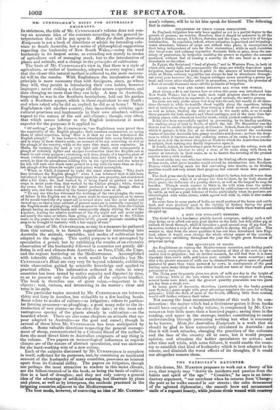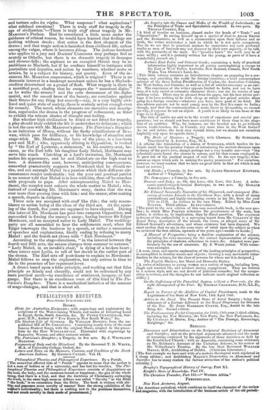THE PATRICIAN'S DAUGHTER.
Is this drama, Mr. Measrox proposes to work out a theory of his own, that tragedy may "derive its incidents and passion from the habits and spirit of the age." " Consider," he says in an intro- ductory argument, " our merchant when he returns from 'Change; the poet as he walks unnoted in our streets ; the calm demeanour of the agitated diplomatist ; the smooth brow and accustomed smile of a regnant beauty, while jealous rivals wound with courtesy and torture selon les regles. What suspense ! what aspirations ! what subdued emotions! There is truly stuff for tragedy in the age of civilization."—There is truly stuff about tragedy in Mr. MARSTON'S Preface. Had he considered a little more under the guidance of critical reason, he would have learned that feelings are nothing without deeds ; that action is the first element of the drama ; and that tragic action is banished from civilized life, unless among the vulgar, where it becomes felony. The jealous husband who applies to a jury and Doctors' Commons may perhaps feel as acutely as Othello, but there is no dramatic tragedy in damages and divorce-bills ; the aspirant to an occupied throne may be as ambitious as Macbeth, but if he confines himself to intrigues with journalists and deputies, and action by numbers, whether mobs or armies, he is a subject for history, not poetry. Even of the in- stances Mr. Memnon enumerates, which is tragical ? There is no dramatic interest in a bankrupt merchant unless he has a Shylock- creditor determined on a pound of flesh. What tragedy is there in a mortified poet, chafing that he escapes the " monstrari digito" as be walks the streets? and the calm demeanour of the diplo- matist, and the smooth brow of the beauty, are conclusive against their fitness for any thing but comedy—nay, in a very highly civi- lized and quiet state of society, there is scarcely action enough even for comedy. The novel, whose elements are narrative and descrip- tion, supersedes the drama in the progress of refinement, as fitter to exhibit the minute shades of thought and feeling. But whether high civilization be fitted or not fitted for tragedy, a play should truly exhibit the life it undertakes to delineate ; which is not the case with Mr. MARSTON'S piece. The Patrician's Daughter is an imitation of Money, without the flashy scintillations of Bur, wzn, which pass for brilliancy, or his knowledge of situation and stage-trick. Mr. Mordaunt, the hero of the piece, is a low-born poet and M.P. ; who, 'apparently shining in Opposition, is invited by " the Earl of Lynterne, a statesman," to his country-seat, be- cause, as the Earl tells his daughter Lady Mabel, Mordaunt may serve him much. Clutching at a lord's invitation, Mr. Mordaunt makes his appearance, and he and Mabel are on the high road to love. A duenna-like aunt, however, anticipating consequences, somewhat prematurely suggests to Mordaunt that he should re- tire, and not entangle Mabel in a passion which their different cir- cumstances render undesirable : but the poor and poetical patriot is no sooner told that Mabel is in love with him, than off he marches with proposals to papa. After misrepresenting Mabel to Mor- daunt, the marplot aunt colours the whole matter to Mabel ; who, instead of confirming Mr. Mordaunt's story, denies that she was ever more than passing time with him : and the orator, after making a speech, departs in dudgeon.
Three acts are occupied with stuff like this ; the only resem- blance to action being at the close of the third act. At the open- ing of the fourth, five years are supposed to have elapsed. During this interval Mr. Mordaunt has gone into rampant Opposition, and succeeded in forcing the enemy's camp ; having become Sir Edgar Mordaunt, and an accepted suitor to Lady Mabel. The wedding- party are all assembled to hear the settlements read, when Sir Edgar interrupts the business by a speech, or rather a succession of speeches and explanations, finally ending by refusing to marry Mabel : and the fourth act closes with " Exit Mordaunt."
According to the stage-directions, " in the interval between the fourth and fifth acts, the season changes from summer to autumn." " Lady Mabel, in an invalid's chair," is dying of a broken heart ; when enters aunt Lydia, to tell of her deceit in the earlier part of the drama. The Earl sets off post-haste to explain to Mordaunt Mabel follows to stop the explanation, but only arrives in time to die in the presence of her repentant lover.
A drama based upon a false principle, and working out that false principle so falsely and absurdly, could not be redeemed by any mere poetical merit—by excellence of sentiment, imagery, or lan- guage. But there is no excellence even of this kind in The Pa- trkian's Daughter. There is a mechanical imitation of the manner of stage-dialogue, and that is about all.



























 Previous page
Previous page